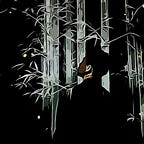Radical Philosophy of Ancient Egypt: Immortality of the Writer
Forget God, forget riches, forget lineage; eternal life lies safely in writing
Philosophy is often construed to be birthed from the ancient Greeks, and understandably so. After all, the gods of the godless often include figures such as Plato, Aristotle, Socrates, and Epicurus.
However, even these great minds pay tribute to the knowledge and ideas of ancient Egyptian sages. Thales and Plato themselves spent years studying with Egyptian priests, and even the great Aristotle refers to Egypt as the cradle of Mathematics, claiming that the mathematical arts had never before been formed, constituted, or elaborated anywhere else originating in Egypt and Egypt alone.
The art of philosophy practiced by the ancient Egyptians is vastly different from what we now perceive philosophy to be. It was characterized by merely two formulas — learning to live, and learning to die.
In other words, the philosophy of the ancient Egyptians were, on one hand, eminently practical, and on the other, metaphysical in nature. Their funeral texts dealt with the latter of the two aforementioned formulas, while the former is addressed mainly through their moral philosophy and wisdom literature.
